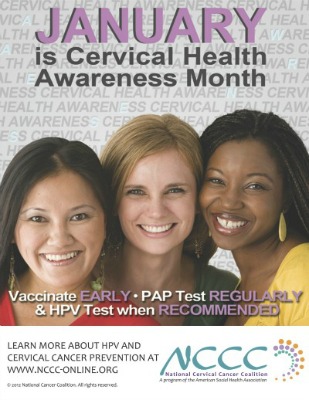
Photo Credit: National Cervical Cancer Coalition
What is Cervical Health Awareness Month?
The United States Congress has designated January as Cervical Health Awareness Month. During January, we as health care professionals, are shedding light on cervical cancer, HPV disease, and the importance of early detection.
What exactly is cervical cancer?
Well, let?s start with the virus first. Human papillomavirus (or HPV as it is called) is the name of a group of viruses that infect the skin. There are more than 100 different types of HPV. Some types of genital HPV may cause genital warts, while other types of genital HPV are linked to abnormal cell changes on the cervix (detected through Pap smear tests). These cervical changes can lead to cervical cancer. However, this cancer can almost always be prevented through regular screenings and, if needed, treatment of abnormal cell changes.
What are some interesting facts that you need to know?*
- HPV can infect anyone who has ever had an ?intimate encounter,? even without going ?all the way.?
- HPV is spread through skin-to-skin contact, not through an exchange of bodily fluid.
- Cervical cancer most commonly takes 10 years to 20 years or more to develop; women who are no longer sexually active should still have Pap tests.
- Approximately 6 million new cases of sexually transmitted HPV occur in the U.S. each year, with at least 20 million people estimated to be currently infected.
- Sadly, most people with HPV do not know that they are infected. It is estimated that 70% of women and men will come into contact with it during their lifetime.
- Fortunately, 80 to 90% of cases the human papillomavirus will be naturally eliminated.
How can you prevent it?
The good news is that cervical cancer is preventable. Early detection of abnormal cell changes is important. Almost all women and men will have HPV at some point, but very few women will develop cervical cancer. The human body is amazing as the immune systems of most women will usually suppress or eliminate HPV. Only an HPV infection that does not go away over many years can lead to cervical cancer.
Being vaccinated before exposure to the virus helps protect women against cervical cancer and the precancerous lesions that precede it. Regular Pap tests will help detect any precancerous or abnormal cells early enough so that cervical cancer can be prevented. Talk to your doctor about the vaccination, but routine screenings can and will definitely save more lives and prevent suffering.
If you have any questions or concerns about cervical cancer see you health care provider.
BMWK, will you join us in spreading awareness about Cervical Cancer Awareness Month?
* National Cervical Cancer Coalition ? www.nccc-online.org
About the author
Source: http://blackandmarriedwithkids.com/2013/01/january-is-cervical-cancer-awareness-month/
guild wars 2 adrian gonzalez Jerry Nelson Foo Canoodle Isaac path Tropical Storm Isaac path
No comments:
Post a Comment
Note: Only a member of this blog may post a comment.